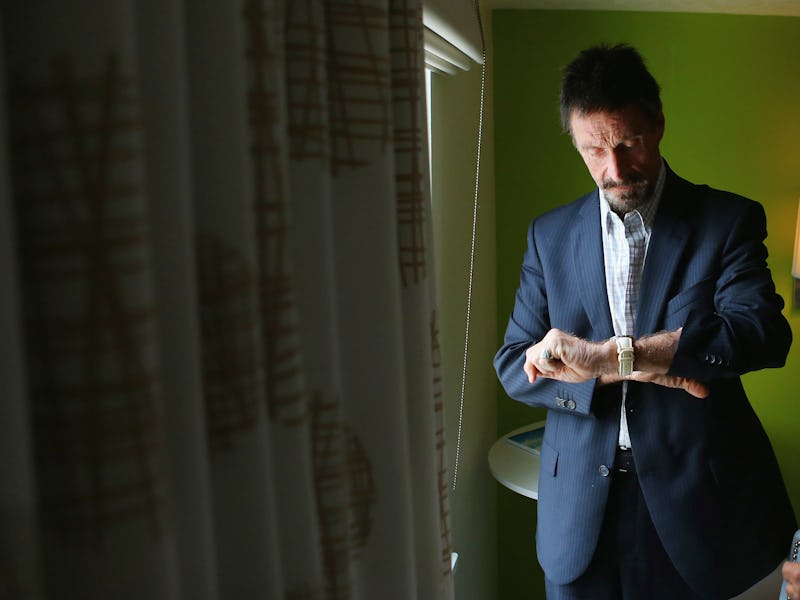John McAfee Says "Outside Party" in iPhone Case Will Make Tim Cook Unhappy
McAfee says he "played a role" in unlocking the San Bernardino iPhone.

On Monday night, the government called off the court’s scheduled hearing and announced that it would be putting a hold on its court order — the order compelling Apple to assist the government in unlocking an iPhone — in the San Bernardino case.
The hearing set for today, Tuesday, was vacated, and the court order was stayed. The government is claiming that a still-unnamed “outside party” demonstrated that it may be able to access the device’s data. These announcements directly contradict the government’s previous claims that only Apple could so assist them — which was the basis for the invocation of the All Writs Act.
Since the news broke, there’s been ample speculation as to the identity of this “outside party.” Many are looking at John McAfee, as back in February he offered up his hacking services to the FBI “for free.”
Inverse asked him today whether he was this “outside party” or if he knew anything about this “outside party”; his only response, at first, was: “Cannot comment.” On Twitter, he echoed these non-responses, though there he additionally claimed that he “played a role.”
But McAfee is the same man who told Inverse earlier this month that he felt like an enemy of the state. He espoused civil disobedience against the government.
McAfee eventually agreed to elaborate by phone on Tuesday.
What can you say about this “outside party?”
The technique that they are using is not my first choice technique, which was to decap the chip. The reason I chose that is because it will only work on that one phone: You gotta do the same thing for every phone you get; it’s a long, tedious process. The technique that they’re using is a pure software technique. And here’s the problem with it: It could potentially, more easily be used to get into other iPhones.
Now, I will not tell you how I know that — because this is how I make my business, right? I’m in the business of knowing things. And, like a magician, I’m not going to tell my secrets. But that’s what’s happening. In a week, this will be announced, anyway. I assure you that Tim Cook will be unhappy with this source.
What do you expect Apple to do?
Well, what can they do? I mean, maybe they can reverse the roles and sue the government not to use this technique.
Anything else that you can weigh in on?
No sir, I can’t. It’s a really touchy situation for me, sir. The fact that I’m even aware of this implicates people. So, in any case, this is the truth of it: It is not decapping the chip, which is the safest for the American people — and the world — in that it works only on that phone, and, they’re not going to just randomly collect phones and do that. Too time-consuming, too expensive. The method they are using: Not time-consuming, not expensive, and could potentially be used for all phones.
On Twitter you said you ‘played a role.’ Can you elaborate on that at all?
Yeah: It was a negative role. I do not want this thing to occur. In any case, it’s happening. If Apple has any decent response at all, they will sue the U.S. government. Because basically what it involves is hacking Apple’s iOS.
Do the newest iPhones or iOS suffer from this vulnerability?
The newest versions may avoid this vulnerability. However, you could use the same approach. You’d have to do a completely different hack, of course. It would be far more complex, because the A7 chip — actually, I’m not even sure you can do it through software with the A7 chip. It might not even be possible on the A7. I have not thought of that; my only concern is that the approach that the FBI has chosen is almost like Apple had done it. And Apple will not like it. I promise you. Apple does not know; Tim Cook himself says We don’t know anything about it, we’ll have to wait until we see what it is. I promise you: When he sees what it is, he will not like it.
McAfee called back not long thereafter to weigh in on today’s other major and tragic story — the attacks in Brussels — which, he said, “is going to bring out the worst in America again about security.”
Moving Forward
Magistrate Sheri Pym gave the government until April 5 to file a “status report” on its efforts to unlock the phone. This report will either say that, via this “outside party,” the government’s successfully broken into the shooter’s work phone — which is probably irrelevant — or that it has failed to do so.
If the former lemma comes about, Apple engineers will have some serious homework: If Apple CEO Tim Cook and his gang are serious in their opposition to the government’s oversteps, then they’ll want Apple to patch whatever hole this “outside party” uncovered. (Not to mention the privacy concerns, that “permanent government backdoor” into our most personal devices that everyone’s been on about.)
If, on the other hand, the outside party and government fail to gain access, it’s reasonable to assume the government will come back full-force. The court order will go back into effect, and the case will proceed.
But if it’s a failure, the government ought no longer to be able to invoke the All Writs Act. Edward Snowden took to Twitter to express the egregious contradictions:
Inverse will continue to follow the story as it develops.